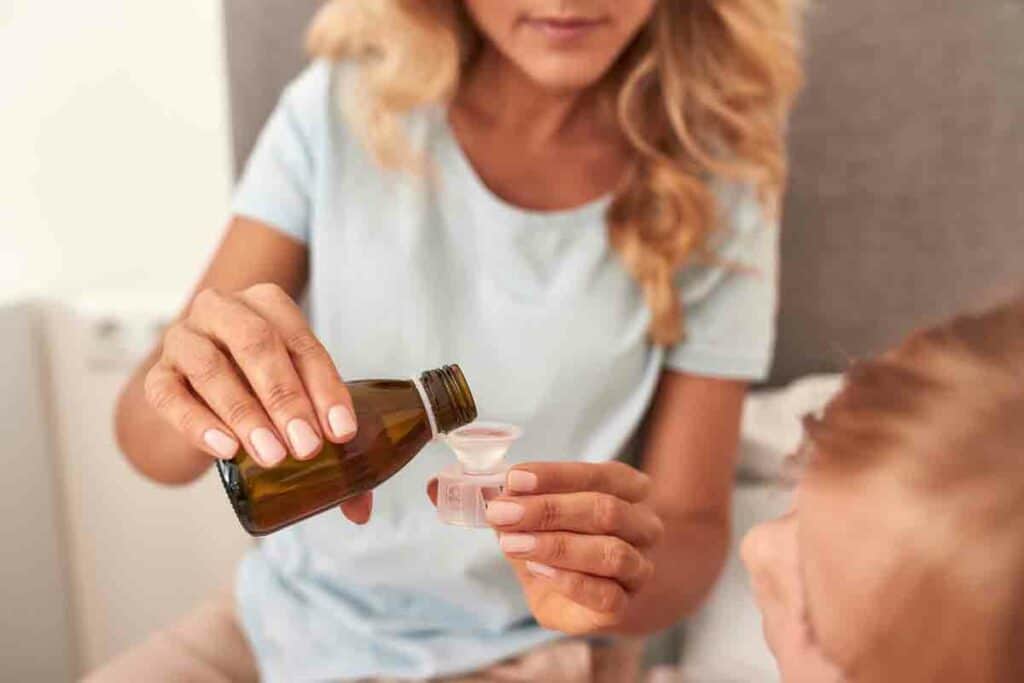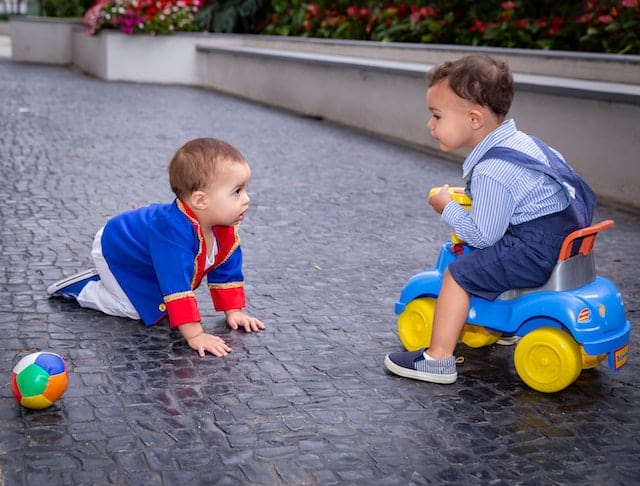Gripe water and gas drops are two popular remedies for colic and gas in babies. Colic is a common condition in infants that causes excessive crying, fussiness, and discomfort. It is often caused by gas, which can be due to a variety of factors such as swallowing air while feeding, lactose intolerance, or an immature digestive system.
Gripe water and gas drops are both designed to relieve colic and gas symptoms in babies. Gripe water is a liquid supplement that contains a combination of herbs and other ingredients that are believed to soothe the digestive system.
Gas drops, on the other hand, contain simethicone, which is a medication that helps break up gas bubbles in the stomach.
Key Takeaways
- Gripe water and gas drops are popular remedies for colic and gas in babies.
- Gripe water is a liquid supplement containing herbs and other ingredients that soothe the digestive system, while gas drops contain simethicone to break up gas bubbles in the stomach.
- While both remedies are generally considered safe, it is important to follow the recommended dosages and consult with a healthcare provider if symptoms persist.
Understanding Colic and Gas in Babies

Colic is a common condition that affects many newborns and infants. It is characterized by excessive crying and fussiness, often for no apparent reason. While the exact cause of colic is unknown, it is believed to be related to digestive issues such as gas and bloating.
Identifying Symptoms
Babies with colic may cry for hours at a time, often in the late afternoon or evening. They may pull their legs up to their chest, arch their back, and have difficulty sleeping. Other symptoms of colic may include:
- Frequent hiccups
- Excessive gassiness
- Fussiness after feeding
- Difficulty passing gas or stools
Gas drops and gripe water are two popular remedies for colic and gas in babies. Gas drops contain simethicone, a substance that helps break up gas bubbles in the stomach.
Gripe water is a combination of herbs and other ingredients that are believed to soothe the digestive system.
It is important to note that while gas drops and gripe water may provide temporary relief for colicky babies, they are not a cure for the condition. Parents should always consult with their pediatrician before giving their baby any medication or herbal remedy.
Causes of Colic and Gas
Colic and gas are common problems that affect infants. While there is no single cause of colic and gas, there are several factors that can contribute to these conditions.
1. Feeding Related Causes
One of the main causes of colic and gas is feeding. Formula-fed babies may be more prone to colic and gas than breastfed babies. This is because formula is harder to digest than breast milk.
Additionally, feeding a baby too quickly or giving them too much formula at once can cause them to swallow air, which can lead to gas and colic.
Another feeding-related cause of colic and gas is food allergies. Some babies may be allergic to certain foods, such as dairy products or soy, which can cause digestive problems and lead to colic and gas.
2. Digestive System and Bacteria
The digestive system plays a significant role in the development of colic and gas. When the digestive system is not functioning correctly, it can lead to the buildup of gas bubbles, which can cause discomfort and pain.
Bacteria in the digestive system can also contribute to colic and gas. When there is an imbalance of bacteria in the gut, it can lead to digestive problems and colic. Probiotics can help restore the balance of bacteria in the gut and reduce the risk of colic and gas.
Other factors that can contribute to colic and gas include stress, constipation, caffeine, and sugar. Sodium bicarbonate may also be used to help reduce the symptoms of colic and gas by neutralizing stomach acid.
Overall, there are several factors that can contribute to colic and gas in infants. By understanding the causes of these conditions, parents can take steps to reduce the risk of colic and gas and provide relief for their babies.
Gripe Water and Gas Drops

1. Ingredients and Efficacy
Gripe water and gas drops are two common remedies used to relieve gas and stomach discomfort in babies.
Gripe water typically contains a combination of herbs such as chamomile, dill, and fennel, while gas drops usually contain simethicone, an anti-foaming agent that helps break down gas bubbles in the stomach.
While the efficacy of these remedies is not scientifically proven, many parents swear by them. Some studies have suggested that gripe water may be effective in reducing colic symptoms, while gas drops have been shown to reduce the frequency and intensity of gas-related crying.
2. Usage and Dosage
Both gripe water and gas drops are available in liquid form and are administered orally. It is important to follow the dosing instructions provided by the manufacturer and to consult with a healthcare provider before giving these remedies to a baby.
Gripe water may contain alcohol, which can be harmful to babies, so it is important to look for alcohol-free options. Some gripe water products also contain sucrose, which can be harmful to babies with reflux or other digestive issues.
Gas drops are generally considered safe and do not have any known side effects. However, it is important to use them as directed and to avoid giving them to a baby who is already taking other medications.
In conclusion, while gripe water and gas drops may provide relief for babies suffering from gas and stomach discomfort, it is important to use them safely and to consult with a healthcare provider if necessary.
Safety and Side Effects
1. Allergic Reactions
It is important for parents to be aware of potential allergic reactions when using gripe water or gas drops. Although rare, some children may experience an allergic reaction to the ingredients in these products.
Symptoms of an allergic reaction may include hives, difficulty breathing, or swelling of the face, lips, tongue, or throat. If a child experiences any of these symptoms, parents should seek medical attention immediately.
2. FDA Regulations and Risks
The Food and Drug Administration (FDA) regulates the safety and efficacy of gripe water and gas drops. These products are considered dietary supplements and are not subject to the same safety and efficacy standards as prescription medications.
However, manufacturers are required to follow FDA regulations regarding labeling and manufacturing practices.
Parents should be aware that there are some risks associated with the use of gripe water and gas drops. These products may contain preservatives or other ingredients that may cause alkalosis or other adverse effects in some children.
Additionally, there have been reports of contamination in some products, which may pose a risk to children.
The American Academy of Pediatrics recommends that parents consult with their child’s doctor before using any over-the-counter medication, including gripe water and gas drops. Doctors can provide guidance on the appropriate use of these products and can help parents identify any potential risks or side effects.
Parents should also be sure to follow the dosage instructions provided on the packaging and should never exceed the recommended dose.
In summary, while gripe water and gas drops can provide relief for infants experiencing gas or colic, parents should be aware of potential risks and side effects. It is important to consult with a doctor before using these products and to follow the dosage instructions carefully.
Alternatives and Soothing Techniques

1. Natural Remedies
For parents who prefer natural remedies, there are several options available to help soothe a baby’s stomach discomfort. Fennel and ginger are two herbs that are commonly used to alleviate gas and bloating.
These can be given to babies in the form of tea or drops. Lemon balm and peppermint are also known to have soothing effects on the digestive system.
Another popular natural remedy is gripe water, which is made from a combination of herbs and is believed to help with colic, teething pain, and other stomach issues.
However, it is important to note that the effectiveness of gripe water has not been scientifically proven, and some types may contain alcohol or other ingredients that could be harmful to babies.
2. Physical Comfort Techniques
In addition to natural remedies, there are several physical comfort techniques that parents can try to help soothe a fussy baby. Swaddling, or wrapping a baby snugly in a blanket, can help them feel secure and calm.
Using a pacifier can also be helpful, as sucking can help babies relax and may stimulate the production of saliva, which can aid in digestion.
Burping is another important technique to try when a baby is experiencing gas or bloating. This can be done by holding the baby upright and gently patting or rubbing their back.
White noise, such as the sound of a fan or a noise machine, can also be helpful in soothing an overwhelmed or fussy baby.
For temporary relief, parents can try using gas drops, which are formulated to break up gas bubbles in the stomach. However, it is important to use these drops as directed and not rely on them as a long-term solution.
Overall, there are several alternatives and soothing techniques available to parents looking to help their baby with stomach discomfort. It is important to consult with a healthcare provider before using any alternative medicine or remedies, especially if a baby has allergies or other medical conditions.
Related: I Accidentally Gave My Baby Too Much Gas Drops
Frequently Asked Questions
What are the best gas drops for newborns?
There are several brands of gas drops available in the market, including Mylicon, Little Remedies, and Mommy’s Bliss. However, it is essential to consult with a pediatrician before choosing a specific brand for your newborn.
How long does it take for gas drops to work?
Gas drops usually work within 5 to 20 minutes after being administered. However, the time it takes for gas drops to work may vary depending on the baby’s age, the severity of the gas, and the brand of gas drops used.
What are the side effects of baby gas drops?
Gas drops are generally considered safe for babies. However, some babies may experience side effects such as diarrhea, constipation, and allergic reactions. If you notice any adverse reactions, stop using the gas drops and consult with a pediatrician.
Can gas drops and gripe water be given together?
It is generally safe to give gas drops and gripe water together. However, it is essential to consult with a pediatrician before giving any medication or supplement to your baby.
Should gas drops be given before or after feeding?
Gas drops can be given before or after feeding. However, it is recommended to give gas drops before feeding to help prevent gas build-up.
Is there a difference between Mylicon and Little Remedies gas drops?
Mylicon and Little Remedies are both simethicone-based gas drops and work in the same way to relieve gas in babies. However, the concentration of simethicone may vary between the two brands. It is essential to consult with a pediatrician before choosing a specific brand for your baby.

Iesha is a loving mother of 2 beautiful children. She’s an active parent who enjoys indoor and outdoor adventures with her family. Her mission is to share practical and realistic parenting advice to help the parenting community becoming stronger.
